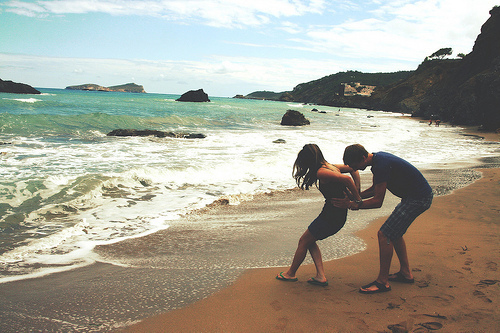
When is it necessary to push things away?
It’s a biological truth: boundaries are necessary in order for insides to remain distinct and protected from the outside.
Every microscopic cell in the body has a perfectly designed boundary; a membrane that welcomes needed substances while preventing entry of damaging ones. All this intricate physiologic complexity is then enclosed by one big protective boundary – the skin.
Our cellular intelligence automatically recognizes when to put its walls up to maintain homeostasis, or equilibrium. Yet, our emotional bodies don’t always duplicate such an efficient filter system. Because the mind is such a complex storehouse of information, and because many of us live with a forced separation of the mind and the intuitive heart, we don’t always know what’s good for us, or what we should keep away from!
We put up our guards when are hearts need opening, and let them down to the things that threaten our freedom, sanity, and wellbeing. We ignore our biological intelligence.
Next time we’re faced with a dilemma of self-preservation vs. self-exposure, I think mimicking the body’s wisdom would be a great place to start solving the problem. We can give ourselves permission to trust that we know how to create appropriate boundaries. Let’s start by asking ourselves the same questions that are cells do:
Is it too much?
Our skin protects us from direct exposure to high-energy things like sunlight, while remaining open to absorbing enough rays to allow for functions like Vitamin D synthesis. We’ve been designed with a perfect harmony between protection and absorption.
Let this be a guide: when something starts to make you feel like you’re losing your cool, step back from it. Sometimes the ability to remember that we are separate from the all-consuming, intense things empowers us to get shade from them when necessary.
Is it too draining?
If we didn’t have skin and if our cells didn’t have membranes, we would risk totally drying out from the insides when exposed to external heat.
If there’s a person, situation, or activity that drains you in this way, consider how you could get back to a state of self-nourishment. Depletion is not an ordinary result of engaging in life, but simply of a misuse of energy. Feeling depleted could be a sign that it’s time to redirect energy to our internal world so that we can fill ourselves up again.
Is it toxic?
Our skin, cell membranes and bodily systems are programmed to protect us against toxic substances, and discard them when they do enter our systems.
There are people, places, and things that are undoubtedly toxic. But there are also misperceptions that arise when an external thing repeatedly triggers the same emotional turmoil. In the latter case, it is often the case that self-respect is a matter of going inwards to heal old wounds rather than looking outwards to block out the things that rub them.
Are we really healthier without it?
The answer to the above questions wont always be ‘walk away’. Many of us are actually very familiar with the concept of avoiding what we don’t want in our lives: isolation is no new phenomena. Courage to protect against danger is vital, but putting up boundaries for the wrong reasons isn’t justified just because it may be easier.
If our bodies decided to drop all responsibility to fulfil all its amazing functions in the face of external complexity, we wouldn’t exist. So they adapt and change the form of things that enter it. Each component of the food we eat is digested in specific ways to utilize and absorb the things that our cells do need, while discarding the rest. When faced with too much heat, we produce sweat to cool us down. Maintaining equilibrium is a dynamic practice, not static one.
I suggest we try to do the same: Let’s take responsibility to respond, react, and utilize our relationship with the external world to our benefit.
This can make co-existence really rewarding! Responsibility comes from love; isolation comes from fear. It’s all a choice. If something is fulfilling in one aspect but draining in another: focus on the fulfilling part. Another thing may fill that hole, but lack in another. It’s all a beautifully complex puzzle, but like the food we eat, we need variety to nourish the many parts of our multifaceted beings. And it goes without saying that the things that taste really bad are not needed. How’s that for instinctual intelligence?!
The body is really, really smart. Let’s take responsibility to define our limits without limiting ourselves, so our mind and spirit can be too!
By Isabella Gucci-Ruffalo
